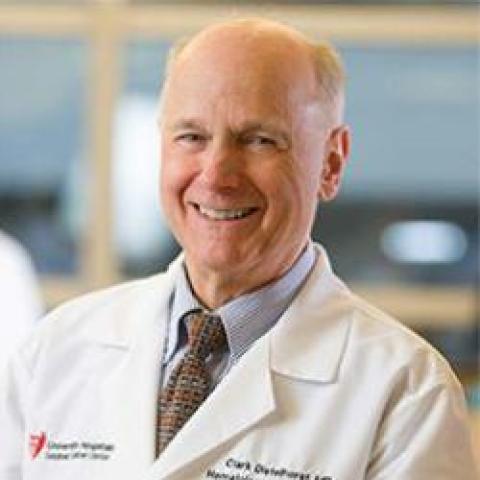Clark Distelhorst, MD, a long-standing faculty member of the Case Western Reserve University School of Medicine Department of Pharmacology, the Department of Medicine at University Hospitals and the Case Comprehensive Cancer Center, passed away on July 3, 2023.
His wife Lynne shared that Dr. Distelhorst was actively working on research and manuscripts over the past month until an acute illness intervened.
“Dr. Distelhorst was recognized as the consummate academic research gentleman, careful with offering his insight, dedicated to his trainees and artful in the detail with which he addressed every pathway he considered,” said Dean Stan Gerson.
Dr. Distelhorst's expertise focused on the role of steroid metabolism and the Bcl2 pathway in lymphoid malignancies, apoptosis and autophagy (in its roles to preserve cell survival). He was considered an expert in this field—his key discoveries include the role of the BH4 domain of Bcl2 and its mediation through limiting calcium signaling to block apoptosis and the potential of a therapeutic peptide from this binding site to block Bcl2 interaction with the inositol triphosphate receptor.
After graduating from the College of Medicine at The Ohio State University, he completed an internship at Yale University. Dr. Distelhorst completed his residency and a fellowship in hematology/oncology at Washington University School of Medicine in St. Louis, where he later joined as a junior faculty member.
An early recruit to the new hematology oncology division at the School of Medicine, he was appointed an associate professor and member of the emerging cancer center in 1985. His prowess as both a physician and scientist was later recognized with his appointment as the Charles S. Britton II Professor of Hematology/Oncology. Dr. Distelhorst was also honored with the Stohlman Memorial Award of the Leukemia Society of America, was an elected member of the Association of American Physicians, and received a Harrington Scholar-Innovator Award from the Harrington Discovery Institute for his development of a Bcl2 binding peptide therapeutic agent.
He led the CWRU T32-funded Cancer Biology Training grant for 23 years and the Cancer Cell Signaling Program of the Case Comprehensive Cancer Center for 27 years. He was a member of multiple study sections and review panels for the National Institutes of Health, the National Science Foundation and the American Cancer Society.
He collaborated internationally and spent a year on sabbatical at the Babraham Institute in Cambridge, UK, relishing in the research conversations of afternoon tea. Few could manage a grant application with the rigor he routinely applied. As a clinician consultant in benign and malignant hematology, he was thorough with his patients and colleagues.
“His impact on the academic lives of so many at our School of Medicine, trainees, fellows, colleagues and physicians was exceptional, and his quiet enthusiasm for scientific discovery will be sorely missed,” said Dean Stan Gerson.
A funeral is planned for Monday, July 17. Details are pending and will be shared once they are finalized.


